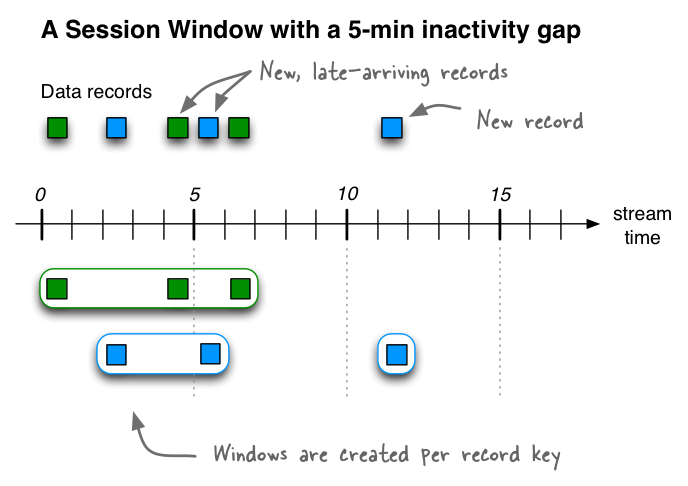- Provide a fast and reliable storage that enable extensibility via Kafka topics.
- Provide full storage functionality via streaming aggregations (e.g., spans queries, dependency graph).
- Create a processing space where additional enrichment can be plugged-in into the tracing pipeline.
- Remove need for additional storage when Kafka is available.
Storage is composed by 4 main components:
- Span Partitioning: repartition of collected span batches into spans keyed by
traceId - Span Aggregation: processing of partitioned spans into aggregated traces and later into dependency links.
- Trace and Dependency Storage: building local state stores to support search and query APIs for traces and dependencies.
This component processes span batches, received via HTTP, Kafka, ActiveMQ, etc.;
take elements with same trace-id and keyed them to be stored on zipkin-spans topic for repartition.
| Property | Environment Variable | Description |
|---|---|---|
zipkin.storage.kafka.span-partitioning-enabled |
SPAN_PARTITIONING_ENABLED |
false disables span partitioning. Consider that Aggregation component requires partitioned spans. Defaults to true. |
zipkin.storage.kafka.partitioned-spans-topic |
none |
Kafka topic where partitioned spans will be stored. Key type: trace-id string, Value type: list of spans with same trace-id. Defaults to zipkin-spans |
This component is currently compensating how
KafkaSender(part of Zipkin-Reporter) is reporting spans to Kafka, by grouping spans into batches and sending them to a un-keyed Kafka topic.
Source code: KafkaSpanConsumer.java
Partitioned spans are processed to produced two aggregated streams: trace and dependency.
Spans are grouped by ID and stored on a local
Session window,
where the traceId becomes the token, and trace-timeout (default: 1 minute)
(i.e. period of time without receiving a span with the same session; also known as session inactivity gap
in Kafka Streams)
defines if a trace is still active or not. This is evaluated on the next span received on the stream--
regardless of incoming traceId. If session window is closed, a trace message is emitted to the
traces topic.
Each color represents a trace. The longer
trace timeoutwe have, the longer we wait to close a window and the longer we wait to emit traces downstream for dependency link and additional aggregations; but also the more consistent the trace aggregation is. If we choose a smaller gap, then we emit traces faster with the risk of breaking traces into smaller chunks, and potentially affecting counters downstream.
Once traces are emitted downstream as part of the initial processing, dependency links are evaluated
on each trace, and emitted the dependencies topic for further metric aggregation.
| Property | Environment Variable | Description |
|---|---|---|
zipkin.storage.kafka.span-aggregation-enabled |
SPAN_AGGREGATION_ENABLED |
false disables span aggregation. Consider that Storage components will require traces and dependency streams as input. Defaults to true. |
zipkin.storage.kafka.aggregation-spans-topic |
none |
Kafka topic where partitioned spans will be consumed from. Key type: trace-id string. Value type: binary list of spans. Defaults to zipkin-spans |
zipkin.storage.kafka.aggregation-trace-topic |
none |
Kafka topic where aggregated traces will be stored. Key type: trace-id string. Value type: binary list of spans. Defaults to zipkin-trace |
zipkin.storage.kafka.aggregation-dependency-topic |
none |
Kafka topic where aggregated dependencies will be stored. Key type: string with parent|child format. Value type: dependency link. Defaults to zipkin-dependency |
This component build local stores from state received on spans Kafka topic
for traces, service names and autocomplete tags.
This component supports search and query APIs on top of local state stores build by the Store Kafka Streams component.
These queries are supported by service names indexed stores built from spans Kafka topic.
Kafka Streams store names:
zipkin-service-names: key/value store with service name as key and value.zipkin-span-names: key/value store with service name as key and span names list as value.zipkin-remote-service-names: key/value store with service name as key and remote service names as value.
These queries are supported by two key value stores:
zipkin-traces: indexed bytraceId, contains span list status received fromspansKafka topic.zipkin-traces-by-timestamp: list of trace IDs indexed bytimestamp.
GetTrace query is supported by zipkin-traces store.
FindTraces query is supported by both: When receiving a query request time range is used to get
trace IDs, and then query request is tested on each trace to build a response.
Supported by a key-value containing list of values valid for autocompleteKeys.
zipkin-autocomplete-tags: key-value store.
| Property | Environment Variable | Description |
|---|---|---|
zipkin.storage.kafka.trace-by-id-query-enabled |
TRACE_BY_ID_QUERY_ENABLED |
false disables query by trace ID GET /traces/{trace_id}. Defaults to true. |
zipkin.storage.kafka.trace-search-enabled |
TRACE_SEARCH_ENABLED |
false disables trace search functionality GET /traces and indexes: service names, span names, tags. Defaults to true. |
zipkin.storage.kafka.storage-spans-topic |
none |
Kafka topic where trace spans are consumed from to build state store. Expected value: list of spans; it does not use record keys. Defaults to zipkin-spans |
Source code: TraceStorageTopology
This component build local state store from dependency stream. It builds a 1 minute time-window when counts calls and errors. When a request is received, time range is used to pick valid windows and join counters.
Windowed store: zipkin-dependencies.
| Property | Environment Variable | Description |
|---|---|---|
zipkin.storage.kafka.dependency-query-enabled |
DEPENDENCY_QUERY_ENABLED |
false disables dependency query store GET /dependencies. Consider that Aggregation component requires partitioned spans. Defaults to true. |
zipkin.storage.kafka.storage-dependency-topic |
none |
Kafka topic where dependencies are consumed from to build state store. Defaults to zipkin-dependency |
Source code: DependencyStorageTopology



